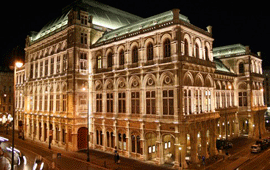> [Archived] Chronicles

Roberto Devereaux Directed by Silviu Purcãrete, Once Again at the Vienna State Opera
When the curtain is raised we can see a décor that will not be altered until the performance is over as it represents the setting for all directorial interpretation. Two rows of box seats with crimson velvet curtains mirror on stage that which is normally in front of it. But in the Royal box seat, the pale shadow of Queen Elizabeth I wearing a red wig draws all attention. The brickwork is reinforced with planks, the columns are cracked, the plastering is rough, the paintjob is sloppy and ill-sorted. Beneath all tinkering, traces of the old withered fresco are still visible. In other words, there is something rotten in England. In this setting I have listened to Donizetti's score in the 29th performance since its premiere in 2000. The star of the show has been, no doubt, Edita Gruberova in the "monster-role" of Elizabeth.
Obviously only the character seems adrift, not the primadonna. I don't think it is exaggerated to say that, by playing this part, Edita Gruberova is actually writing a piece of history. The artist is not only a coloratura soprano with an exceptional arsenal of vocal abilities, but also an actress with great dramatic sense. Compared to the realism and the multitude of her expressions, the order vocalists, and, unfortunately, José Bros - interpreting Roberto Devereaux - in particular, seemed almost spiritless. On the other hand, it is possible that the lack of movement was more of a direction issue, but as far as the cast is concerned, there was a striking difference in intensity between Gruberova's interpretation and the interpretation of all other artists.
Anyway, the performance was a highly-deserved success. A lot of it was due to Gruberova - she is the one who managed to convey, especially in the dramatic ending, the true feeling of theatre, true emotions.
The ending was also the climax of the performance. When Elizabeth takes off her wig with trembling hands and the décor, unchanged until then, is suddenly cleft and disappears - half of it towards the ceiling and the other half underneath the stage - I finally understood how the motionless setting somehow made sense. The relatively limited play and the minimalistic visuals left a lot of room for the musical part and ingeniously highlighted it: for instance the choral instrumentalisation. Dressed in black, with bowler hats in the 30's fashion, the choir, at times resembles courtiers and, at times, spies lurking from behind the curtains (maybe an innuendo against the Shakespearean Polonius, the archetype of the spy hidden behind a curtain?). The choir are also grave diggers, observers, spectators etc. They move both on the ground floor and on the first floor of the stage, in the vertical space created in between the two rows of box seats. This is also the space haunted by Elizabeth's ghost, authoritarian at times, angry, harsh at other times.
The Donizettian belcanto was sung by good vocalists. Interpreting Sara was the Bulgarian Nadia Krasteva, the Japanese barinton Eijiro Kai was very convincing, tenor José Bros with his well trained voice, managed to create wonderful lirical moments. I enjoyed all of them as conducted by Evelino Pidó, a natural Italian maestro.
Translated by Mihaela Melneciuc
MTTLC, Bucharest University














